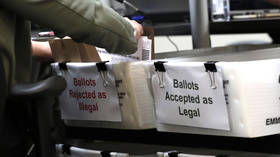How is the US election going to be any more legitimate than the ‘rigged’ Belarus vote?

Belarusians have taken to the streets to protest what many claim was a rigged election. Yet the US election – with its hyper-partisan media, nonsense polls, and both parties determined to contest a loss – makes Minsk’s look legit.
The US is one of many countries to condemn Belarusian President Alexander Lukashenko over his supposedly rigged reelection and his government’s brutal crackdown on the protests that followed. Secretary of State Mike Pompeo promised to “deliver freedom” to Minsk, and even Hollywood star Chuck Norris made a bizarre video threatening to make the president “cry.”
Also on rt.com Pompeo feels insulted when quizzed about US crackdown on protesters at home after he bashed ‘authoritarian regimes’ for sameBut if the Belarusian election was corrupt and illegitimate, what does that make the US’ own electoral contest, which looms less than three months in the future? Many American political tactics that have become routine would elicit cries of outrage from the West if another country’s politicians used them.
From the closing of polling places in poor and minority neighborhoods to gerrymandering to superPACs and dark money, US “democracy” is profoundly un-democratic – and getting worse. The amount of money spent on American elections alone would be denounced as corruption, even outright bribery, if it happened anywhere else, but US races routinely break spending records with little fanfare. The 2016 contest cost $6.8 billion, a sum that exceeds the GDPs of Guyana or the Maldives.
Zombie candidates
The high cost of entry means it’s nearly impossible to attain national office without financing from deep-pocketed donors – most of whom want something for their money. As a result, the most successful candidates are sometimes, paradoxically, the weakest - those who donors and party leaders believe they can manipulate. Hence 2020’s Democratic pick, Joe Biden: as a young senator, he proclaimed on national TV that he was “ready to prostitute [him]self” to big-money donors. If his subsequent lifetime serving big-money interests in Washington is any indication, they took the offer.
Party insiders often cite “electability” in dismissing populist candidates like Vermont Senator Bernie Sanders or even Donald Trump (whose campaign promised to Drain The Swamp before he dived gleefully into that same swamp), but what they mean is “appeal to donors.” The most “electable” candidates - those who make it to the presidential race - have in recent years been the least popular. When “only” 35 percent of voters responded to a Morning Consult poll earlier this month reporting “very unfavorable” views of Biden, the pollster hailed it as an improvement over his 2016 counterpart Hillary Clinton’s eye-popping 46 percent “very unfavorable” rating.
Partisan media
Zombie candidates can’t exist without a media willing to cover for them, and just as they covered for Hillary Clinton’s health problems in 2016, the American media establishment have been running full-time interference for what many believe is incipient dementia in Biden. The candidate has spent election season hiding in his basement, emerging to deliver baffling, even offensive statements that journalists write off as harmless jokes or a “childhood stutter” that never surfaced when Biden was VP. The candidate is propped up, Weekend-at-Bernie’s style, while they focus on demonizing his opponent.
Some channels wear this partisanship on their sleeve, but others further gaslight their audience by claiming to present the unvarnished truth. CNN, for example, has maintained a facade of neutrality even after employees were caught on hidden camera explaining that CEO Jeff Zucker is motivated by a personal vendetta against Trump. The Washington Post still insists its owner, mega-billionaire Amazon founder Jeff Bezos, doesn’t influence content – never mind the 24-hour period in March 2016 in which they published 16 negative stories on Sanders, who has repeatedly savaged Bezos and Amazon’s business practices.
Also putting their thumbs on the scale are social media companies, which after Trump’s unexpected victory were galvanized (with a push from US intelligence) to clamp down on freedom of information, ensuring no such surprises could ever happen again. Anything that remotely challenges the establishment narrative is being censored in the run-up to 2020’s contest, a situation that would elicit screams of repression from the West if it was happening in Belarus. According to researcher Robert Epstein, Google alone threw 16 million votes to Clinton in 2016 - given the partisan tilt of Silicon Valley, one can only imagine how many votes Big Tech will divert Biden’s way in 2020.
Fake numbers
It isn’t just the media lying to Americans’ faces: pollsters present a distorted picture of voter preferences in an effort to shove favored candidates down the electorate’s throat. The same groups behind the disastrously skewed polls that showed Clinton with a 98 percent chance of victory on the eve of 2016’s election are now deeming Biden’s victory imminent, though by a smaller margin, despite an acknowledged “enthusiasm gap” among voters with a pulse. At the same time, discrepancies in exit polls were almost completely ignored in the 2020 primaries, despite strongly indicating something was amiss with Biden’s “JoeMentum.”
Proprietary machines and dodgy apps
Most voting in the US is done on electronic voting machines, whose source code is a trade secret and whose security is so pitiful they can be hacked by a child in minutes. Before 2009, the top voting machine makers were Diebold and ES&S, both strongly tied to the Republican Party. An outrageous merger of the two companies lasted just a year before it was forced to spin off the former Diebold, but the company’s machines remain in use under the brand Dominion Voting Systems. They’re still easily-hackable black boxes, and the problem isn’t limited to voting machines – election software like the infamous Shadow app that sank 2020's Iowa caucus has opened even more security holes.
A bumper crop of “election security” outfits sprang up after 2016’s “Russian meddling” scare, many of which are linked to US and Israeli intelligence and party insiders. Microsoft has offered its ominous Pentagon-funded election-security tech to polling places for free. American voters shouldn’t trust this crowd to take out the garbage, let alone safeguard their franchise. With this many spooks horning in on the vote, the 2020 election will be riddled with so many backdoors it’s not a question of if the vote is being tampered with, but how much.
Also on rt.com Coronavirus is coming, hide the ballots! Calls to cancel campaigns & voting erode already-thin trust in US primariesPivot to mail-in
One way around the exit poll problem is mail-in ballots, which come with myriad opportunities for fraud that the media establishment would have Americans believe are mere figments of the president’s imagination. From ballot harvesting to ballot stuffing to mere incompetence, the risks to a fair election posed by mail-in voting are nearly as many as posed by proprietary electronic voting machines. And that was before Trump threatened to starve the post office of the funding required to conduct an all-mail-in election.
Never admit defeat
While 2016 loser Hillary Clinton did quietly call Trump to concede the night of the election, she also set a disastrous precedent by refusing to accept her loss as legitimate, blaming everyone from Russian bots to WikiLeaks. Many liberals still believe Russia was responsible for Trump’s victory, despite a massive three-year special investigation that turned up no proof the president’s campaign had “colluded” with Moscow.
It’s perhaps no surprise, then, that both parties are already spending as much time plotting to delegitimize a victory by the other side as they are planning for their own wins. The delays built into mail-in vote counting mean any Election Day results may end up reversed, guaranteeing at least one “side” will be motivated to take to the streets, Belarus-style.
When that happens, don’t expect any of the countries currently excoriating Lukashenko’s government for its undemocratic democracy to call out Washington.
Like this story? Share it with a friend!
The statements, views and opinions expressed in this column are solely those of the author and do not necessarily represent those of RT.
















